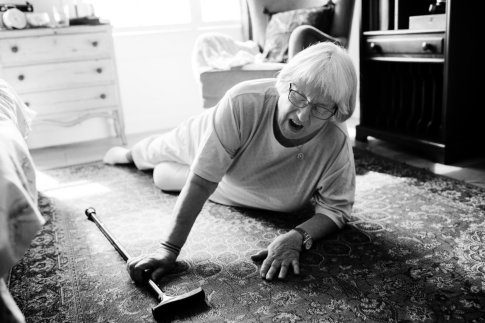
Through education and self-examination, we can eliminate the likelihood of falls. We can assess your situation and address the issues that are important to you and your family.
Health & Safety:
- Do you take 4 or more medications daily? Multiple medications can cause dizziness, drowsiness and balance problems. It is important to have all your medications reviewed at least once a year by a pharmacist or doctor.
- Have you or those around you noticed a change in hearing? Dizziness can occur with hearing loss. Set up an appointment to have your hearing checked.
- Have you or those around you noticed a change in vision? Seeing obstacles is the first step in avoiding a fall. Keep your glasses clean. Have your eyes examined once a year.
- Have you fallen 2 or more times in the past 6 months? Get a checkup! Falls lead to injuries. You need to find out why you are falling.
- Do you wear floppy slippers or a long bathrobe? Wear well-fitting slippers with non-skid soles. Avoid night clothing that drags on the ground. Keep robe tied.
- Are your walkways or stairs cluttered? It is very important to have shoes, books, etc put away so the areas are clear when ambulating.
- Are you getting enough exercise? Be active and use your muscles appropriately. Exercise is important to keep your strength strong and your circulation moving smoothly.
- Are you hurrying too much? Plan ahead and try not to rush when going to do something. Running to the phone, for example, could create you to lose your balance and a fall could ensue. It is very important to after rising from furniture wait a few seconds before going to the next thing. Falls happen from the BP dropping too quickly after rising to a standing position so take those extra minutes to let the blood get down to the lower extremities.
- What about your medications? Checking on medications and determining if some of them create dizziness is imperative to keep you safe. Some medications such as BP medications, diuretics, and sleeping pills are just some of the many different classifications of drugs that could create a fall.
- How much alcohol are you consuming? Be careful of the ingestion of alcohol, as alcohol can create you to have slower reflexes and also create a sense of sedation.
- Are you getting enough sleep? Get enough sleep. Sleepy people tend to fall more frequently.
- Are you letting your MD know of any health concerns or recent falls? Always alert your doctor if you have fallen (even if you are not hurt) at your next check-up as this could be indicating a deeper health concern.
Abilities: Do You Have Trouble . . .
- Reaching overhead? Put commonly used things on shelves that are easy to reach. If you must reach overhead, keep a sturdy step stool handy.
- Picking up objects from the floor? Plan and move the object closer to something sturdy to hold on to.
- Getting in and out of the bathtub? Consider adding grab bars to the walls or using a tub seat to assist with bathing. Non-skid tub mats and a handheld shower can also be useful.
- Getting in and out of a chair? Avoid sitting on low furniture. Chairs with arms make it easier to get up.
- Walking without holding on to something? If you feel unsteady without holding on to something, you may need a cane. Consult your doctor or health care provider.
Avoid icy or wet sidewalks. Make sure to walk on the grass if you are unsure.
Home: Do You Have . . .
- Throw rugs? Throw rugs pose a tripping hazard. They should be tacked down or removed.
- Stairs without rails? Using handrails to go up and downstairs is easier and safer. Add handrails to all stairs, if possible.
- Clutter in your walking space? Clutter such as shoes, electrical cords, and magazines is a safety hazard. Keep pathways clear.
- Dark hallways or stairwells? Good lighting can reduce the chance of falling. Consider adding night lights where overhead lighting is lacking. Add bright tape strips to the edge of each stair to indicate where the edge is located. Always keep a charged flashlight near your bed for emergencies. A night light in the bathroom can also make night trips to the bathroom safer. Consider glow in the dark light switches.
- Wet floors from a spill? Clean up spills immediately after the spill is identified so as not to slip.
- Repairs that need to be done? Repair loose floorboards that could create a tripping hazard.